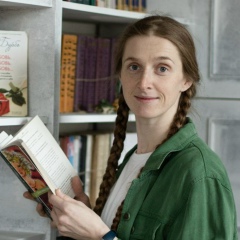про позитив
Прислала мне клиентка статейку про позитивное мышление, и мне начало думаться на эту тему.
Я вижу так.
Позитивно настроенных людей (как и "духовно развитых") я про себя делю на два типа.
В первом случае это люди немного... мм.. дефицитарные. Те, кто в позитив сбегает от неприятных и неприемлемых чувств, подавляя в себе последние. Как метко описал их муж: "у меня всё плохо, но я улыбаюсь, потому что так надо". И ведь правда. У них даже улыбка какая-то... плачущая. Ну или натянутая, пластиковая. Ненастоящая. И глаза стеклянные. Они сыпят мудростями и чьими-то цитатами, но как-то не чувствуется, что они эти мысли прожили, пропустили через себя и свой жизненный опыт. Они боятся страха, гнева, обиды, грусти. И в себе, и в других. Поэтому они склонны обесценивать неприятные переживания. Они не разделят горе. Это друзья только в радости, потому что видеть "негатив" даже у другого в глазах им страшно. Срезонирует ведь с тем, что внутри, что скрывается и отрицается. Интересно, как эту природу вымученного позитива чувствуют окружающие. А чувствуют они неподдельное раздражение. Не то, которое бесит, потому что человек - другой и на нас не похожий. А то, когда хочется ткнуть "позитивного" палкой дабы проверить, жив ли он вообще. Настоящий? Чувствует что-то человеческое? И за эти мысли вдобавок становится стыдно. Чувство вины мучает. Ну как же, такой хороший ведь... парадокс в том, что вот так от несчастно-позитивного отворачиваются люди. Вроде он прекрасен, со всех сторон положителен и замечателен, но почему-то не ценят...
А есть ещё второй вариант позитивно настроенных людей. Это те, кто пережил много горя. Кто прожил это горе, поварился в нём, не сбегая и не затыкая ни злость, ни обиду. У кого за плечами тонны негативного опыта. И эти люди - живые. А позитив для них - осознанный выбор. Они бывают и расстроенными, и злыми, и смешными. Интересно, что те же мудрости из их уст звучат совсем по-другому; они становятся ценными. Потому что всё это прожито, всё это личное и настоящее, а не бездушное и холодно-красивое. Такие ребята, конечно, тоже могут вызывать раздражение, но иное. Во-первых, оно появляется в ответ на отдельные проявления личности и поведения, а не на человека в целом. Во-вторых, раздражение в таком случае имеет совсем другую природу. Оно есть, потому что позиции жизненные разные, потому что в них чувствуется другой опыт. Но он существует. И они в состоянии выдержать не только радость, но и весь спектр человеческих эмоций. Оттого с ними не страшно расслабиться и признаться в чём-то.. даже социально не одобряемом. Они поймут. Может, даже поругают, но прочувствуют. И всё равно поймут
Эти различия в позитиве и мудрости для меня особенно остро чувствуются в процессе обучения. Я много училась у кучи самых разных людей и поняла: как только я вижу эту натянутость, как только не чувствую жизнь - взять оттуда можно только информацию, не больше. И ту нужно очень внимательно рассматривать, пробовать на вкус, пропускать через всевозможные фильтры, включать критику. А бывает, что учитель из числа вторых. Тут он вообще ничего нового может не сказать, это не важно. Иногда и говорить-то незачем. Можно просто смотреть и чувствовать. Ну или рядом посидеть.
[id32764|Екатерина Амеялли], психолог тренингового центра «Отношения.ру»
Прислала мне клиентка статейку про позитивное мышление, и мне начало думаться на эту тему.
Я вижу так.
Позитивно настроенных людей (как и "духовно развитых") я про себя делю на два типа.
В первом случае это люди немного... мм.. дефицитарные. Те, кто в позитив сбегает от неприятных и неприемлемых чувств, подавляя в себе последние. Как метко описал их муж: "у меня всё плохо, но я улыбаюсь, потому что так надо". И ведь правда. У них даже улыбка какая-то... плачущая. Ну или натянутая, пластиковая. Ненастоящая. И глаза стеклянные. Они сыпят мудростями и чьими-то цитатами, но как-то не чувствуется, что они эти мысли прожили, пропустили через себя и свой жизненный опыт. Они боятся страха, гнева, обиды, грусти. И в себе, и в других. Поэтому они склонны обесценивать неприятные переживания. Они не разделят горе. Это друзья только в радости, потому что видеть "негатив" даже у другого в глазах им страшно. Срезонирует ведь с тем, что внутри, что скрывается и отрицается. Интересно, как эту природу вымученного позитива чувствуют окружающие. А чувствуют они неподдельное раздражение. Не то, которое бесит, потому что человек - другой и на нас не похожий. А то, когда хочется ткнуть "позитивного" палкой дабы проверить, жив ли он вообще. Настоящий? Чувствует что-то человеческое? И за эти мысли вдобавок становится стыдно. Чувство вины мучает. Ну как же, такой хороший ведь... парадокс в том, что вот так от несчастно-позитивного отворачиваются люди. Вроде он прекрасен, со всех сторон положителен и замечателен, но почему-то не ценят...
А есть ещё второй вариант позитивно настроенных людей. Это те, кто пережил много горя. Кто прожил это горе, поварился в нём, не сбегая и не затыкая ни злость, ни обиду. У кого за плечами тонны негативного опыта. И эти люди - живые. А позитив для них - осознанный выбор. Они бывают и расстроенными, и злыми, и смешными. Интересно, что те же мудрости из их уст звучат совсем по-другому; они становятся ценными. Потому что всё это прожито, всё это личное и настоящее, а не бездушное и холодно-красивое. Такие ребята, конечно, тоже могут вызывать раздражение, но иное. Во-первых, оно появляется в ответ на отдельные проявления личности и поведения, а не на человека в целом. Во-вторых, раздражение в таком случае имеет совсем другую природу. Оно есть, потому что позиции жизненные разные, потому что в них чувствуется другой опыт. Но он существует. И они в состоянии выдержать не только радость, но и весь спектр человеческих эмоций. Оттого с ними не страшно расслабиться и признаться в чём-то.. даже социально не одобряемом. Они поймут. Может, даже поругают, но прочувствуют. И всё равно поймут
Эти различия в позитиве и мудрости для меня особенно остро чувствуются в процессе обучения. Я много училась у кучи самых разных людей и поняла: как только я вижу эту натянутость, как только не чувствую жизнь - взять оттуда можно только информацию, не больше. И ту нужно очень внимательно рассматривать, пробовать на вкус, пропускать через всевозможные фильтры, включать критику. А бывает, что учитель из числа вторых. Тут он вообще ничего нового может не сказать, это не важно. Иногда и говорить-то незачем. Можно просто смотреть и чувствовать. Ну или рядом посидеть.
[id32764|Екатерина Амеялли], психолог тренингового центра «Отношения.ру»
about positive
The client sent me an article about positive thinking, and I began to think about this topic.
I see so.
I divide the positively-minded people (as well as the "spiritually developed") into two types.
In the first case, these people are a little ... mm .. scarce. Those who in the positive escapes from unpleasant and unacceptable feelings, suppressing the latter in themselves. As their husband aptly described: "everything is bad with me, but I smile because it is necessary." And the truth is. They even have a kind of smile ... crying. Well, or stretched, plastic. Fake. And the eyes are glass. They pour in wisdom and someone’s quotes, but somehow it doesn’t feel like they lived through these thoughts, passed through themselves and their life experience. They are afraid of fear, anger, resentment, sadness. Both in oneself and in others. Therefore, they tend to discount unpleasant experiences. They will not share grief. They are friends only in joy, because they are scared to see the “negative” even in another's eyes. Indeed, it resonates with what is inside, what is hidden and denied. It is interesting how others feel this nature of tortured positive. And they feel genuine irritation. Not the one that infuriates, because the person is different and not like us. And then, when you want to poke a "positive" stick in order to check whether he is alive at all. Present? Feels something human? And for these thoughts in addition it becomes a shame. Feeling guilty is tormenting. Well, how so good, after all ... the paradox is that people turn away from the unhappy-positive like that. It seems to be beautiful, positive and wonderful from all sides, but for some reason they don’t appreciate it ...
And there is another option for positively-minded people. These are those who have experienced a lot of grief. Who lived this grief, boiled in it, not running away and not plugging neither anger nor resentment. Who has tons of negative experience. And these people are alive. And the positive for them is a conscious choice. They are upset, and evil, and funny. Interestingly, the same wisdom from their lips sound completely different; they become valuable. Because all this has been lived through, all this is personal and real, and not soulless and cold-beautiful. Such guys, of course, can also cause irritation, but otherwise. Firstly, it appears in response to individual manifestations of personality and behavior, and not to the person as a whole. Secondly, irritation in this case has a completely different nature. It is, because the positions of life are different, because they experience a different experience. But he exists. And they are able to withstand not only joy, but the whole range of human emotions. That’s why it’s not scary to relax with them and admit to something .. even socially disapproved. They will understand. Maybe even scolded, but feel. And they will understand anyway
These differences in positive and wisdom are especially acute for me in the learning process. I studied a lot from a bunch of different people and I realized: as soon as I see this tension, as soon as I don’t feel life - you can only get information from there, not more. And that one needs to be carefully considered, tasted, passed through all kinds of filters, include criticism. And it happens that the teacher is one of the second. Here he can say nothing new at all, it doesn’t matter. Sometimes there’s no reason to say something. You can just watch and feel. Well, or sit next to.
[id32764 | Ekaterina Ameyalli], psychologist at the training center "Relationships.ru"
The client sent me an article about positive thinking, and I began to think about this topic.
I see so.
I divide the positively-minded people (as well as the "spiritually developed") into two types.
In the first case, these people are a little ... mm .. scarce. Those who in the positive escapes from unpleasant and unacceptable feelings, suppressing the latter in themselves. As their husband aptly described: "everything is bad with me, but I smile because it is necessary." And the truth is. They even have a kind of smile ... crying. Well, or stretched, plastic. Fake. And the eyes are glass. They pour in wisdom and someone’s quotes, but somehow it doesn’t feel like they lived through these thoughts, passed through themselves and their life experience. They are afraid of fear, anger, resentment, sadness. Both in oneself and in others. Therefore, they tend to discount unpleasant experiences. They will not share grief. They are friends only in joy, because they are scared to see the “negative” even in another's eyes. Indeed, it resonates with what is inside, what is hidden and denied. It is interesting how others feel this nature of tortured positive. And they feel genuine irritation. Not the one that infuriates, because the person is different and not like us. And then, when you want to poke a "positive" stick in order to check whether he is alive at all. Present? Feels something human? And for these thoughts in addition it becomes a shame. Feeling guilty is tormenting. Well, how so good, after all ... the paradox is that people turn away from the unhappy-positive like that. It seems to be beautiful, positive and wonderful from all sides, but for some reason they don’t appreciate it ...
And there is another option for positively-minded people. These are those who have experienced a lot of grief. Who lived this grief, boiled in it, not running away and not plugging neither anger nor resentment. Who has tons of negative experience. And these people are alive. And the positive for them is a conscious choice. They are upset, and evil, and funny. Interestingly, the same wisdom from their lips sound completely different; they become valuable. Because all this has been lived through, all this is personal and real, and not soulless and cold-beautiful. Such guys, of course, can also cause irritation, but otherwise. Firstly, it appears in response to individual manifestations of personality and behavior, and not to the person as a whole. Secondly, irritation in this case has a completely different nature. It is, because the positions of life are different, because they experience a different experience. But he exists. And they are able to withstand not only joy, but the whole range of human emotions. That’s why it’s not scary to relax with them and admit to something .. even socially disapproved. They will understand. Maybe even scolded, but feel. And they will understand anyway
These differences in positive and wisdom are especially acute for me in the learning process. I studied a lot from a bunch of different people and I realized: as soon as I see this tension, as soon as I don’t feel life - you can only get information from there, not more. And that one needs to be carefully considered, tasted, passed through all kinds of filters, include criticism. And it happens that the teacher is one of the second. Here he can say nothing new at all, it doesn’t matter. Sometimes there’s no reason to say something. You can just watch and feel. Well, or sit next to.
[id32764 | Ekaterina Ameyalli], psychologist at the training center "Relationships.ru"
У записи 24 лайков,
4 репостов.
4 репостов.
Эту запись оставил(а) на своей стене Екатерина Оксанен








































